Pakistan ranks 154th on children's rights index
Britain, NZ failing on children's rights: global survey
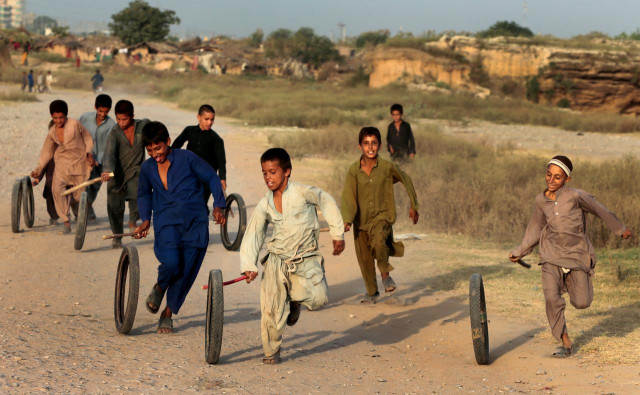
Children play with tyres in Islamabad, Pakistan. PHOTO: REUTERS
Pakistan ranked 154th on a survey mapping the extent to which countries adhere to improving children's rights and their capability to do the same.
The KidsRights Index ranks all countries that are a party to the United Nations (UN) Convention on the Rights of the Child (CRC), says the website.
The index "provides crucial insights into what is being done and where countries need to do better to fully implement the CRC". It covers five domains with a total of 20 indicators.
The five domains are:
1. Right to Life
2. Right to Health
3. Right to Education
4. Right to Protection
5. Enabling Environment for Child Rights
Pakistan scored 0, 574 in life, 0, 511 in health, 0, 405 in education, 0, 567 in protection and 0, 643 in child rights environment. The overall score was 0, 492. The value of missing indicators was one.
Sindh achieves target of inoculating 7.3m children for measles
Meanwhile, the survey revealed that Britain and New Zealand are failing on children's rights, scoring lower than war-torn Syria and North Korea relative to their wealth in rankings.
"Appalling" discrimination against migrant children and a lack of legal protection for poorer youths in New Zealand and the United Kingdom put them near the bottom of the annual survey by Dutch NGO KidsRights.
"It's a shame that countries like the United Kingdom and New Zealand are really at the lowest ranks of this index," Marc Dulleart, founder and chairman of KidsRights, told AFP.
Britain ranked 170 and New Zealand 169 in a survey of 181 countries.
Iceland was top followed by Portugal, Switzerland, Finland and Germany. Afghanistan was worst, followed by Sierra Leone, Chad, Equatorial Guinea and the Central African Republic.
The annual KidsRights rankings, compiled with the Erasmus School of Economics in Rotterdam, use UN data to measure how countries measure up to the UN Convention on the Rights of the Child.
"Of course the situation in the UK is far better than in Afghanistan or Syria, but it's relative to their position," Dulleart said. "The message is that considering their economic status and it is a democracy and it is a country not in war, then it is appalling in such a rich developed country that the score on the basic principles of the Convention on the Rights of the Child is the lowest score."
Booming economic growth in countries such as China, India, and Myanmar is meanwhile failing to translate into better rights for children, the group said.
89% of children enrolled in schools: report
'Old-fashioned mindset'
However Thailand and Tunisia ranked surprisingly highly, at 14th and 15th, because with the "limited resources they have, they put everything into the next generation", said Dullaert.
The group said giving children around the world a bigger say was crucial. It cited the examples of youth movements such as teen climate activist Greta Thunberg's school marches and US rallies for gun control after school shootings.
"We are still underestimating the power of these movements," said Princess Laurentien of the Netherlands, who founded the Missing Chapter Foundation to install boards of children in companies, and has worked with KidsRights.
"We need to get rid of this old fashioned mindset that we the adults have all the answers," added the princess, who is the sister-in-law of Dutch King Willem-Alexander.
She also urged governments to invest in children now to reap future benefits - citing the example of Dutch football team Ajax, whose young team stunned Europe by making the semi-finals of the Champions League this year.
"It's a bit like 'why is Ajax playing so well' - and we're incredibly proud of them by the way - it's because 10 years ago they had the right strategy, investing in youth. Then it shows up later that we have stars."
KidsRights also presents an annual international children's peace prize whose previous winners include Pakistani Nobel laureate Malala Yousafzai, who was shot in the head by the Taliban in 2012.

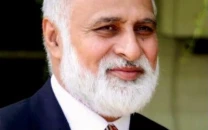
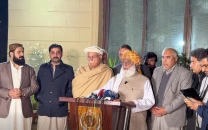
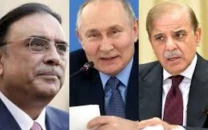

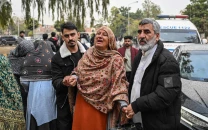













COMMENTS
Comments are moderated and generally will be posted if they are on-topic and not abusive.
For more information, please see our Comments FAQ